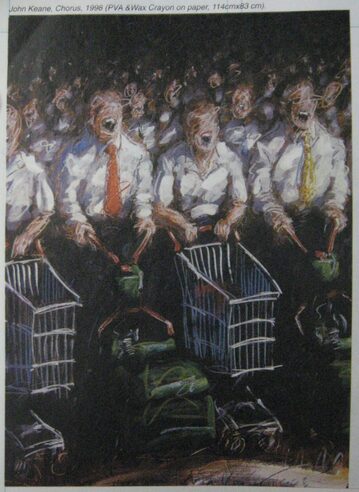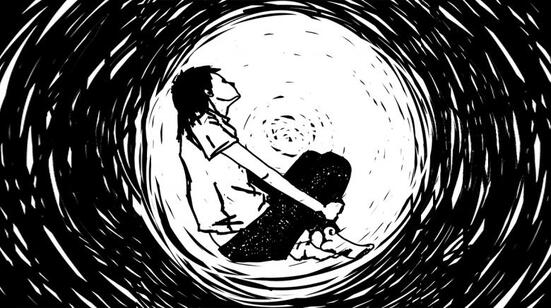|
In the United States, an estimated 16.2 million adults suffer at least one major depressive episode per year.[1] That’s 6.7% of the country who find themselves frequently battling with crippling depression, leaving them under motivated, and trapped in a downward spiral of mental negativity. Even those who don’t have clinically diagnosed depression can relate to these feelings. The tasks of life in our endlessly productive capitalist society can become overwhelming at times, even for the happiest of people. This feeling often leads us to isolate ourselves from the outside world, and fall deeper into the downward spiral of depressive thoughts. There are things that can be done to combat depression of course. Healthy eating, exercise, meditation, consuming positive content, and therapy are all great ways to break out of the depressive thought cycle. However, human beings must also look at the system of production we have created, which is currently leaving so many feeling depressed and hopeless. Under capitalism, many workers find themselves isolated from the things that truly bring them joy. Most people spend eight or more hours a day working dead end jobs. In return for their labour, workers receive wages or salaries which they hope will be enough to support their families. Meanwhile the owners of the companies we work for make enormous sums of money, which they often use to purchase vacation homes, or other luxuries. It then becomes the goal of every employee to achieve the position of company owner, and if not, they must become content with the 9-5 grind. This rat race coerces human beings into becoming cogs in our capitalist system, and as a result, alienates us from the joys of life. The capitalist mode of production creates a culture, which incentivizes the pursuit of hoarding money above all else. Success is measured by your wallet, rather than your overall happiness. For these reasons I believe it is capitalism which is fueling the modern day crises of suicide and depression in America. American society often falls into the mentality of victim blaming. When problems occur, we tend to place the blame on individuals, before we address macro level systemic problems, which may be more difficult to see. Depression is a clear example of this phenomenon. The US is currently facing a suicide epidemic. The year 2018 saw, 48,344 Americans committed suicide, while 1.4 million more attempted to take their own lives.[2] In response, many have jumped to place blame on the individuals who have taken their own lives. The line “Suicide is selfish”, has become a popular among Americans when discussing suicide. It is selfish to take the easy way out, ending your own life, while leaving family and friends behind to mourn your loss. Suicide does not take the pain away, it simply redistributes that pain to loved ones. In a sense, I agree. Nobody should take their own life, and if you’re considering it, you MUST reach out and get help. Taking your own life will leave those who care about you in unimaginable pain. That being said, the line “suicide is selfish” shows how we immediately jump to placing blame on the individual. Instead, we must investigate the societal ills, which no doubt play a factor in the continued rise in cases of suicide and depression. For an example, let’s quickly examine the American military. You would be hard pressed to find any American who argues that US troops are selfish. Regardless of your thoughts on US foreign policy, the troops truly believe they are signing up to sacrifice their own lives for the good of others. These are people with a desire to fight for, and protect those they love. Now consider the fact that 20 US veterans commit suicide every single day.[3] So, are these suicidal service men selfish? Are the troops simply too weak minded to handle the struggles of life? Of course not. No rational human being would argue that military personnel are committing suicide at astounding rates, because they are simply weak minded. Many troops join the military from societal pressures pushing them into service. Whether it be paying for college, promise of a stable income straight out of high school, or the desire to “defend the country”; all three are some of the main reasons why people join the military. High schools all across the country are littered with military recruiters, waiting in the hallways to push impressionable 16 year olds into joining the armed forces. Many kids do join the army, and are eventually deployed overseas, where many see active combat. However, upon returning home, troops are rarely provided the resources they need to cope with the trauma of war. The system which sends our kids to war, does very little to help those same kids cope with the trauma they experience in combat. The system allocates vast amounts of resources for recruitment, and weapons for killing. However, it spends much less on resources to help those brave souls returning from combat. Suicidal veterans are not people who are lazy or weak. They are products of a system which profits of warfare, and leaves those who do the fighting to fend for themselves, upon returning to the country they swore to defend. I bring up military suicides not only to shine a light on such a horrendous issue, but also to portray how mental health and depression are not choices. They’re not things which can be flipped on or off with a switch. They are invisible killers, which infect the mind, and send even the strongest among us spiraling into infinitely negative patterns of thought. I also use the military example to show how things we experience physically, greatly effect what we feel mentally. Although someone may return from war with no outer scars, they may have inner scars, which are much harder to see. In fact, what makes these mental scars so deadly, is that they are often invisible to those who care about us most. While not all of us have seen armed combat, everyone has their struggles. Most anyone can relate to being stuck in a pattern of negative thought. It leaves you feeling overwhelmed, like your spiraling out of control with no way out. Everyone experiences traumas, which we strive to overcome on a daily basis. We silently fight these mental battles, while simultaneously managing to keep up with the demands of everyday life. Most all of us, operating within the capitalist mode of production, experience these feelings. In many of their works, Karl Marx and Frederick Engels analyzed the anxiety and isolation that most workers experience under capitalism. Out of this, they developed their theory of alienation. Marx’s theory of alienation argues that capitalism transforms people’s labour into a power which dominates the activities of their daily lives. Human labour power has created all the material comforts that we enjoy in modern society. Housing, agriculture, education, and entertainment are all produced through human labour. Labour is what extracts raw materials from the earth, and transforms them into commodities for human consumption. This labour is unique to humans, and has allowed us to create massive civilizations, and make incredible technological advancements. However, the capitalist mode of production, while producing a massive amount of commodities, also alienates humans from their own labour. The average person does not view their ability to labour as an incredible gift, which has allowed for the creation of modern civilization. Instead, we are angrily awoken by our alarms each day, before drudging off to work in order to sell our labour to a capitalist, who in return provide us enough money to survive, the “means of subsistence.” Humans are kept from viewing their own labour as the engine which sustains life, and allows for the human species to live in relative comfort. Instead, we simply view our labour as something that must be sold to a capitalist, with the alternative being starvation, or the starvation of one’s family. Human Labour becomes a coercive force, which drains our mental and physical energy on a daily basis. Under the capitalist mode of production, human labour power is not used for the betterment of all society, but is instead, a tool for maximizing the profits of those who own private property. While capitalism allows for commodity production levels to remains high, it turns the working masses into wage slaves, keeping the workers trapped in a metaphorical golden chain; stuck in a society where the majority of people, spend the majority of their time selling labour to a capitalist, creeating a material abundance that the capitalist indulges in greatly. Meanwhile, the worker is thrown the measly scraps of what his labour created. Many modern day economists use Gross Domestic Profit as the primary measurement for economic welfare. The more profit a country makes, the more prosperous that country will be, and as a result, people’s lives will be better. However, this theory does not hold up to scrutiny, and has forced many economists to rethink GDP as a measure of economic success. Since the end of World War 2 the United States has maintained the highest GDP in the world. This includes the past 20 years, where the US has remained the richest country from 2000-2020. Yet, at that same time, suicide rates in the US have increased by 30%.[4] Clearly, the increasing wealth of American society has not correlated to increased happiness. In a world of material abundance, many still feel that life is not worth living. It brings to mind Marx’s quote from his New York Tribune article Population, Crime and Pauperism, where he says: “There must be something rotten in the very core of a social system which increases its wealth without diminishing its misery.”[5] While humans have created vast material abundance, the working masses have remained alienated from their labour, and have seen their wages stagnate for years. Until something is done to create a better life for the working masses of society, issues such as suicide and depression will persist. As with our many military service members battling depression, the working masses of society face material problems, which leads to emotional hopelessness. These issues will not only persist, but increase as the capitalist mode of production marches along. U.S. Workers have seen their wages stagnate for decades.[6] Young Americans entering the job market are seeing very little hope for their future. As automation continues to decrease the number of available manufacturing jobs, the service industry has grown by 5.4%.[7] Young Americans see in their futures, lives confined to working unfulfilling service industry jobs, and receiving measly wages in return. In addition, young Americans who choose to pursue college level education, are now finding themselves trapped under a mountain of student debt. An issue which didn’t exist, at least not at this level, for previous generations. The sense of hopelessness, and increase in suicide, finds its root causes in the capitalist mode of production. The Covid-19 pandemic has no doubt exacerbated the many contradictions of capitalism, which are driving people into depression. While hard data is still hard to come by at the time of writing this article, the CDC has been clear that the number of mental health issues have increased during the pandemic. [8] The economic shutdown has increased economic instability, and quarantine has increased alienation from other humans. This only adds to the hopelessness of those who already see no future for themselves within the current system. So, what is the solution? Those who still believe in the merits of capitalism will tell you that the solution is hoarding. Go to a cheap college, work the entire time, never spend a dime of your money, and one day you will either be able to retire, or you can become a capitalist yourself. Then you may live a life of luxury as one of the few exploiters, rather than remaining among the masses of those who are exploited. However, many young people are beginning to question this model. Some feel that the cost of living is too high to ever allow for them to accrue enough savings for retirement. Others see that becoming a capitalist yourself may decrease your own personal misery, but will then position you as someone who is making money via the exploitation of others who remain miserable. This is why so many young people have begun to question the system itself. Socialism now hovers around 50% favorability among Millennials and Gen Zers.[9] Our generations feel trapped and alienated by the current system. Marxism offers an explanation of why the system feels broken, and socialism gives us a vision for something new. A society where human labour power is used to maximize the freedom and development of all humans, rather than to enrich the select few people who happen to own the factories we toil in. Young people must not be resigned to the system we’ve been born into. Instead we must put our heads down, and put in the hard work it will take to change this system. Shed those feelings of alienation and depression, which have been engrained in you by the modern-day capitalist system. Find renewed motivation in the struggle to create a better world for ourselves, and all those who will be born after us. We must reject the capitalist propaganda which assures us success in life is equivalent to how much wealth one accrues. In the same way religion and sports help people to find joy in fighting for a cause bigger than themselves, we must find joy and purpose in our fight to create a better world, which uses human labour power to maximize the development and happiness of all peoples. Citations
[1] Koskie, Brandi. “Depression: Facts, Statistics, and You.” Healthline. Healthline Media, June 3, 2020. https://www.healthline.com/health/depression/facts-statistics-infographic. [2] “Suicide Statistics.” American Foundation for Suicide Prevention, July 29, 2020. https://afsp.org/suicide-statistics/. [3]“Suicide Among Veterans and Other Americans.” VeteransAffairs.gov, 2014. https://www.mentalhealth.va.gov/docs/2016suicidedatareport.pdf. [4] Winerman, Lea. “By the Numbers: An Alarming Rise in Suicide.” Monitor on Psychology. American Psychological Association, January 2019. https://www.apa.org/monitor/2019/01/numbers. [5] Marx, Karl. “Population, Crime, and Pauperism.” Karl Marx in New-York Tribune 1859. Accessed September 22, 2020. https://www.marxists.org/archive/marx/works/1859/09/16.htm. [6] U.S. Workers have seen the wages necessary to supporting themselves, stagnate for the decades. [7] Lazzari, Zach. “What Are the Causes of Rapid Growth in the Service Industry?” Small Business - Chron.com. Chron.com, January 22, 2019. https://smallbusiness.chron.com/causes-rapid-growth-service-industry-16007.html. [8] Falcon, Russell. “Are Suicides on the Rise during the COVID-19 Pandemic?” KXAN Austin. KXAN Austin, September 3, 2020. https://www.kxan.com/news/coronavirus/are-suicides-on-the-rise-during-the-covid-19-pandemic/. [9] Saad, Lydia. “Socialism as Popular as Capitalism Among Young Adults in U.S.” Gallup.com. Gallup, September 11, 2020. https://news.gallup.com/poll/268766/socialism-popular-capitalism-among-young-adults.aspx.
4 Comments
Thom Prentice
9/26/2020 12:45:56 pm
You are a brilliant young man who has the superb ability to translate and describe ... connect the dots .., between Daily lived experience in capitalism and Marxist Critique.
Reply
V.
10/1/2020 08:38:58 pm
Very good analysis!
Reply
Sean OSullivan
12/7/2020 09:22:12 pm
Great article
Reply
Leave a Reply. |
Details
Archives
July 2024
Categories
All
|



 RSS Feed
RSS Feed